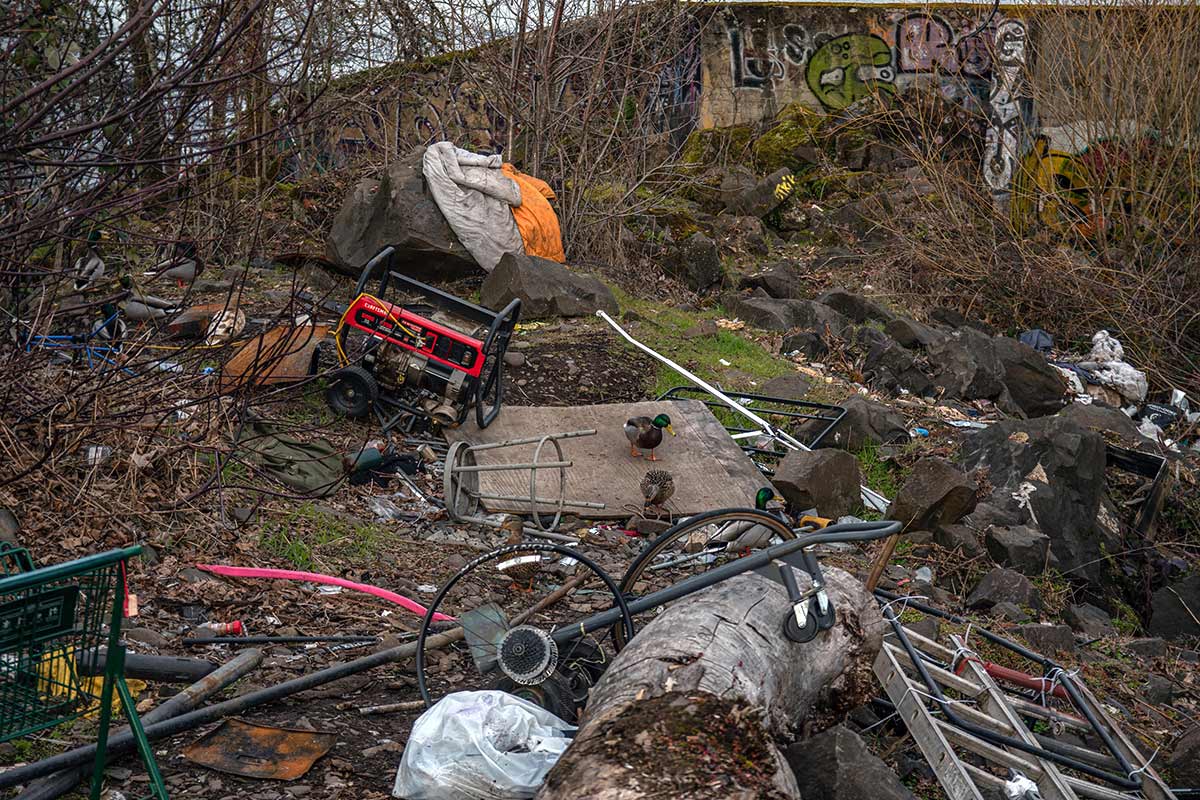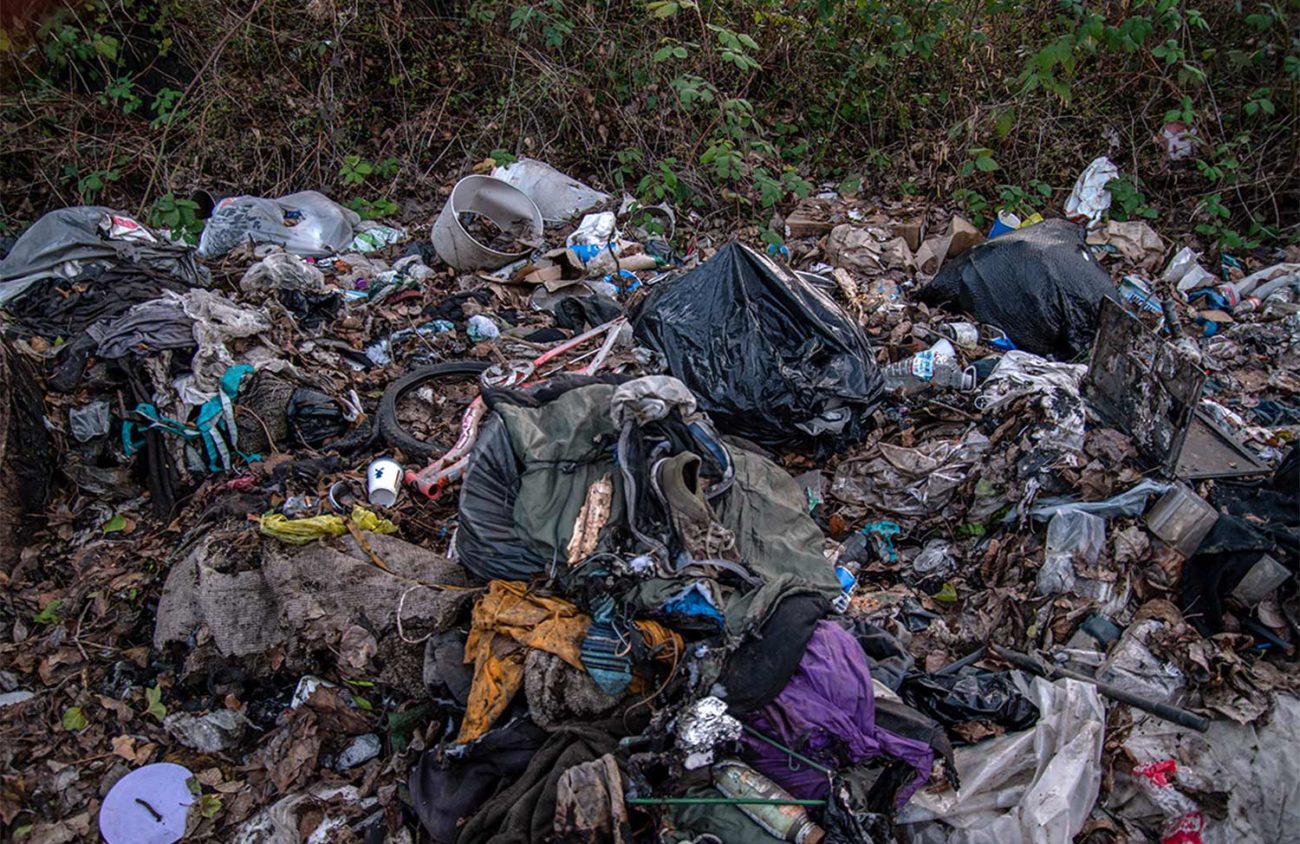By Bentley Freeman, EvE Weston and Hannah Seibold
The city of Eugene has hit Union Pacific Railroad with more than $216,000 in fines for failing to clear piles of trash from homeless camps along rail lines north of Franklin Boulevard for a half-mile stretch of the Willamette River.
City records say Union Pacific broke repeated promises to keep the site clean and prevent illegal camping. Instead, records show, the company has repeatedly ignored requests to discourage campers and remove heaps of debris. City records also say that Union Pacific used heavy equipment to bury trash on site. Documents and witnesses say broken furniture, shopping carts, shipping pallets, chicken wire, needles and feces spill into the river from the six-acre Union Pacific site.
The city’s enforcement action is extraordinary, given that Eugene officials have known about the problems and allowed them to fester for nearly a decade. What remains unaddressed is what will happen to the unhoused people who camp on the Union Pacific land the city wants cleared.
Documents show the city issued a civil penalty notice to Union Pacific on May 2, 2022, citing repeated violations of ordinances that prohibit camping, garbage accumulation and conditions that attract rats. The city has been levying a $1,100-a-day penalty since then.
Willamette Riverkeeper, a nonprofit dedicated to protecting and restoring the river, says that runoff from the site threatens water quality. Michelle Emmons, upper watershed program manager for Willamette Riverkeeper, says that trash has floated into estuaries and creates a hazard for the organization’s volunteers who work to remove the debris.
“It is really a mess. There are feces. There’s needles. There are campfires with blown-up objects and electronics in them. There are poop buckets,” Emmons says, noting her organization has been working to clean the site since 2014. “I mean it’s not a good thing. It’s not clean for the people who live there, either.”
Union Pacific declined to answer questions about the violations. But Union Pacific spokesperson Daryl Bjoraas writes in a prepared statement that the company has worked diligently to respond to the city’s concerns, including a recent cleanup in 2021.
“Union Pacific understands and shares the community’s frustration with illegal dumping and camping on this Eugene property,” Bjoraas says in an email to Eugene Weekly. “Union Pacific has invested considerable time and resources for more than a decade repeatedly removing homeless encampments, drug paraphernalia, garbage and latrines from this site.”
Eugene officials acknowledged that they had cited Union Pacific but would not discuss the violations. City officials also declined to answer why it took several years before the city took enforcement action and levied civil penalties against Union Pacific.
City spokesperson for unhoused response Kelly McIver says officials were not available for an interview before EW’s deadline.
Lindsay Selser, communications and engagement manager for the city’s Planning and Development Department, says in a written response to EW that the current case against Union Pacific started in 2018.
“The property has been cleaned at least once since that time,” Selser writes in an email. “We have been engaged in a process to bring this property into compliance for years.”
In 2014, EW reported on efforts to clean portions of the Union Pacific property, behind what is now the 2125 Franklin student housing complex. At the time, John Brown, an EWEB commissioner, criticized the city for failing to deal with the trash and for failing to provide more safe sites available for the unhoused.
Brown says he didn’t know about the civil penalties against Union Pacific until EW asked him about the city’s actions. Brown says he doesn’t know why the city took so long to act.
“They should not get a free pass,” Brown says of Union Pacific. “I hope the city fines the living hell out of them and uses the money to hire people to clean it up.
City records show code compliance officials received multiple complaints about the site and had enforcement jurisdiction over the area since 2015, but it took three years before the current case opened.
On Nov. 19, 2018, Eugene’s code compliance office received a complaint through Public Works staff describing illegal camps and trash. “It’s been chronically problematic,” the complaint says, “and we’re struggling with how to get their attention to abate this ongoing water quality and natural resource impact.”
That day, records show, the city ordered Union Pacific to correct the problem within 15 days. City officials also threatened to investigate the site.
City records say Union Pacific failed to comply with the city’s request. The records include no evidence that city officials followed up with an inspection.
Eight months later, in July 2019, the city received a complaint describing human waste and needles at the site. Records show city officials waited three months to visit the property to confirm the issue before contacting Union Pacific.
In November 2019, Union Pacific agreed to have a railroad police officer each week enforce the anti-camping rules and keep the site clear of debris, according to city records. Willamette Riverkeeper promised to routinely clear debris from state lands right along the river.
Union Pacific spokesperson Bjoraas wrote that the company has also been a consistent partner in the effort, including working with Willamette Riverkeeper.
Emmons disagrees. “They didn’t report back,” she says. “They didn’t engage. They just showed up at a meeting. They said yes, this all sounds great. And then they never followed up.”
Union Pacific declined to respond to questions about how it followed through on its earlier promises.
Enlarge

Two months later, in January 2020, another complaint cited more than 20 makeshift shelters made from tents and tarps, and what one eyewitness called “probably thousands of pounds of trash and who knows how much human waste.” The complainant wrote trash and human feces were entering the river.
“The railroad has been aware of this at least since November,” a city inspector wrote in the case file, “yet no action appears to have been taken.”
Union Pacific spokesman Bjoraas writes that the railroad has undertaken cleanups and carried them out thoroughly. “Union Pacific works to remove all garbage and camping equipment from the site each time a cleanup is undertaken,” Bjoraas writes.
City records tell a different story.
In February 2020, city officials learned that Union Pacific had cleared the area using heavy equipment and that trash had been buried along the riverbank. According to records, the railroad also built a gravel road in an environmentally sensitive area.
“Instead of cleaning up the trash, they basically took an excavator to knock down a bunch of trees and vegetation, and they flipped the garbage back into the dirt, so it was buried underneath the soil,” Emmons says. “That was a huge issue for us.”
City officials threatened that “penalties would likely be issued as a result.”
No penalties against Union Pacific followed. Within weeks, the COVID-19 pandemic arrived and the state of Oregon issued orders against sweeping camps of the unhoused. Documents show, however, that Union Pacific did not remove trash and other debris.
In December 2020, nine months after threatening to issue penalties, city officials returned to the site and found “14-15 unique camps/tent sites, including two at track level. Also various piles of discarded clothing, belongings, etc. littered along the track level and down below. Everything at lower level could be easily impacted by high water in the winter/spring.”
Three months later, in March 2021, the city received another complaint about the site. “That riparian zone is a trash heap,” the complainant wrote. “There are other smaller camp messes, but this one is the worst. Lord only knows what they’re putting in the river.”
For more than a year, city officials prodded Union Pacific to clean up the site with no success, records show.
Finally, in May 2022, the city issued its findings of camping and nuisance violations and started to levy the $1,100 daily penalty against Union Pacific.
Willamette Riverkeeper’s Emmons says she doesn’t blame the city for taking nearly a decade to take legal action against Union Pacific. She says city officials have worked with her organization and many others to help clear trash and debris at the site while attempting to get Union Pacific to do the right thing.
“The city worked really hard to not have to go some compliance code route or litigation route,” Emmons says. “Union Pacific backed out, did not follow up, did not communicate, did not circle back on the promises that they weren’t going to deliver on. The situation got to the point of no return.”
Emmons says that, as far as she knows, Union Pacific has not taken any meaningful steps to help the people camped on its property. “They could have talked to a number of agencies in our town about how to work with the houseless community to get people moved out of the area and into a safer space,” Emmons says. “But they didn’t do that — they did nothing.”
During a visit on Feb. 19, EW counted 20 camps. Broken couches sit amid the grass and old rugs sink into the soil. Needles lie scattered between tracks. The odor of feces, cigarette smoke and mildewing clothes permeates the air. Barking dogs, clanking metal and rushing water echo along the river.
Residents call the camp “Mario Land,” a name inspired by an illegal BMX track once located on the site. The track resembled the popular Mario Kart video games, according to residents.
Mario Land residents, who declined to provide their last names out of fear of repercussions for camping illegally, believe that most people on the riverside are considerate and try not to throw trash into the river. Shauna and Daniel say that they have unearthed trash at the site during the month they have camped there. “We’ve started fires and had hairspray cans blow up because they are sitting under the surface,” Daniel says.
Shauna says railroad officials have largely left the campers alone. “It’s actually pretty cool down there,” she says. “The railroad is pretty cool with us. They [Union Pacific] don’t bother you too much. They’ll come through when they have to.”
But the residents worry about what will happen if the city compels Union Pacific to comply with its orders and launch camp clearances.
“They’re maliciously doing away with us,” says James, who says he has been unhoused for 10 years. “Our numbers are dwindling out here very rapidly. And people are not even noticing or caring. I’m starting to get scared.”
This story was developed as part of the Catalyst Journalism Project at the University of Oregon School of Journalism and Communication. Catalyst brings together investigative reporting and solutions journalism to spark action and response to Oregon’s most perplexing issues. To learn more visit CatalystJournalism.uoregon.edu or follow on Twitter @uo_catalyst.
